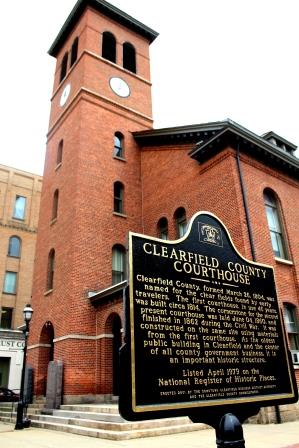CLEARFIELD – A former Coalport man convicted three times for the murder of a classmate is asking for a new trial.
Andrew Callahan, now 36, was only 16 years old when he shot Micah James Pollock in November of 1997 in Pine Run, Beccaria Township.
He was convicted in 1998, 2007 and 2010 and received a life sentence without a chance for parole each time. Appeals overturned the verdicts of the 1998 and 2007 trials because of errors with the jury instructions.
Testimony in the case revealed that Callahan had threatened to kill his Glendale High School classmate, Pollock, if he did not stay away from his ex-girlfriend.
The day after shooting Pollock in the back, Callahan returned to where he had buried Pollock with pine branches. He tried to stuff the body in a garbage can but when it did not fit, he tied it to a vehicle and dragged it to a beaver pond where he dumped it.
Callahan’s case has been on appeal again due to a U.S. Supreme Court determination that life without parole for juveniles is an unconstitutional sentence (the ruling is retroactive and affects all previous cases).
A ruling on the Commonwealth v Qu’eed Batts case in late June established guidelines on how to proceed with this development.
The Commonwealth now has the burden of proof, according to District Attorney William A. Shaw Jr.
To receive a life without parole sentence, the prosecution will have to show that the defendant is incapable of rehabilitation. This can involve expert testimony and testimony from witnesses, he said.
This has led to several cases being reviewed for possible re-sentencing including Callahan’s case, which was scheduled for a hearing Friday.
In addition to the re-sentencing issue, Callahan’s current attorney, Shawn McGraw, filed motions for a new trial and for funds to retain an expert.
It was determined that the other motions are moot pending a decision by Senior Judge Daniel L. Howsare of Bedford County on the new trial issue.
Howsare is specially presiding over this case because President Judge Fredric J. Ammerman recused himself.
During the hearing, McGraw called Callahan’s attorney from the 2010 trial, Ron Valasek, to testify regarding his decision not to pursue a voluntary intoxication defense as was done in the other trials.
Valasek explained that he decided to focus on the death as the result of an accidental shooting because “the strategy of the first and second trials didn’t work.”
McGraw asked Valasek if he was aware of Callahan’s drug use at the time of the murder, which Valasek replied yes.
He then went on to ask specifically about Callahan’s use of marijuana, LSD, cocaine and pills, including mescaline, which is a hallucinogenic.
Then he asked if Valasek was aware of the testimony of a doctor in the 2007 trial who determined Callahan was under the influence and unable to form the intent to kill, which is necessary for first-degree murder.
He went on to ask why Valasek did not call any experts to testify about this issue. Again Valasek stated that he had a single focus defense for an accidental shooting rather than voluntary intoxication.
McGraw pointed out through the use of the trial transcripts that Valasek did ask Callahan about his drug use when he testified in his own defense and Valasek replied that this had been brought up first by the Commonwealth.
Valasek had also questioned Callahan’s ex-girlfriend about Callahan’s drug habit, McGraw noted.
In explanation to that, Valasek said that information was part of determining the timeline of the day.
When asked why he didn’t include the voluntary intoxication defense as part of his accidental death defense, Valasek said he was not sure.
The instructions given the jury were the focus of additional questioning by McGraw, who pointed out that voluntary intoxication was explained to the jury with their other instructions.
During their deliberations, the jury asked for clarification on the elements of first- and third-degree murder and these were reviewed again. The voluntary intoxication was not mentioned at that time.
McGraw asked why Valasek didn’t insist on a repetition of the definition of voluntary intoxication.
Valasek noted that the jury asked specifically to hear the requirements for first- and third-degree murder again and not anything else.
When pressed for more specifics on the decisions Valasek made for the case, he was unable to remember because “I’ve done 7,000 cases since then.”
Both sides will review a transcript of this hearing before preparing briefs on the issue of effectiveness of counsel and request for a new trial.
Howsare gave counsel 90 days to submit these briefs. The Judge will review that information before he hands down his decision.



